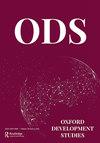全球化、国际不对称与民主:结构主义视角
IF 1.2
Q3 DEVELOPMENT STUDIES
引用次数: 0
摘要
摘要近年来,国际合作,特别是在多边基础上的合作,已经失去了优势。在这一过程中,许多发展中国家和发达国家的核心民主价值观受到侵蚀。以罗德里克在国际政治经济学中的三重困境为出发点,我们使用中心-边缘结构主义模型来分析国际制度、国际合作和民主之间的关系,该模型承认各国在技术和生产能力方面存在不对称。我们讨论了结构主义模式在不同国际制度下的增长和收入分配结果,即布雷顿森林制度和超全球化制度。我们认为,超全球化导致了一种隐性偏见,这种偏见损害了收入分配和国际体系的稳定性。此外,由于自然资源密集型部门或非熟练劳动力部门的不平等和专业化的再现,超全球化对民主产生了负面影响。我们根据亚洲和拉丁美洲在增长和结构变化方面的经验,以及民主与更复杂的经济结构之间的积极联系,提出了一些实证证据来支持这些结果。本文章由计算机程序翻译,如有差异,请以英文原文为准。
Globalization, international asymmetries and democracy: a structuralist perspective
ABSTRACT International cooperation, especially on a multilateral basis, has lost ground in recent years. This process has been accompanied by the erosion of core democratic values in many developing and developed countries. Taking Rodrik’s trilemma in international political economy as a point of departure, we analyze the relationship between international regime, international cooperation and democracy using a center-periphery structuralist model, which acknowledges the existence of asymmetries in technological and productive capabilities across countries. We discuss the outcomes of the structuralist model in terms of growth and income distribution under different international regimes, namely the Bretton Woods regime and the hyperglobalization regime. We argue that hyperglobalization gives rise to a recessive bias that compromises income distribution and the stability of the international system. In addition, hyperglobalization has a negative effect on democracy stemming from the reproduction of inequality and specialization in sectors intensive in natural resources or unskilled labor. We present some empirical evidence supporting these results based on the Asian and Latin American experiences in growth and structural change, and on the positive association between democracy and more complex economic structures.
求助全文
通过发布文献求助,成功后即可免费获取论文全文。
去求助
来源期刊

Oxford Development Studies
DEVELOPMENT STUDIES-
CiteScore
2.70
自引率
0.00%
发文量
20
期刊介绍:
Oxford Development Studies is a multidisciplinary academic journal aimed at the student, research and policy-making community, which provides a forum for rigorous and critical analysis of conventional theories and policy issues in all aspects of development, and aims to contribute to new approaches. It covers a number of disciplines related to development, including economics, history, politics, anthropology and sociology, and will publish quantitative papers as well as surveys of literature.
 求助内容:
求助内容: 应助结果提醒方式:
应助结果提醒方式:


